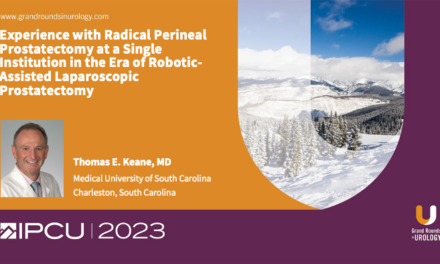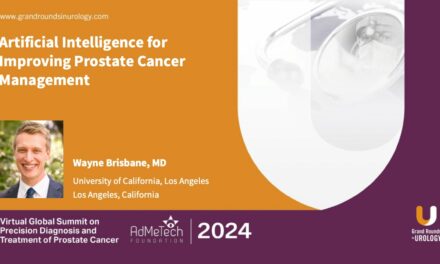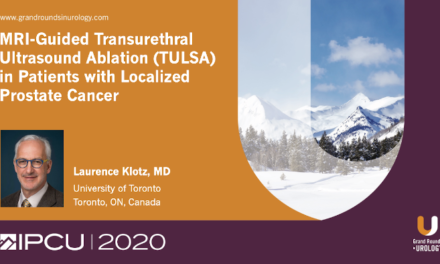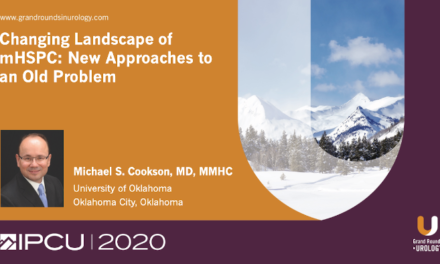Peter R. Carroll, MD, MPH, presented “PSMA PET Imaging at Time of Diagnosis” during the 31st International Prostate Cancer Update in July 2021 in Snowbird, Utah.
How to cite: Carroll, Peter R. “PSMA PET Imaging at Time of Diagnosis.” July 2021. Accessed Nov 2025. https://grandroundsinurology.com/psma-pet-imaging-at-time-of-diagnosis/
PSMA PET Imaging at Time of Diagnosis – Summary
Peter R. Carroll, MD, MPH, Professor of Prostate Cancer and Urology at the University of California, San Francisco, discusses PSMA PET imaging and compares it to conventional imaging at the time of diagnosis. He states that conventional imaging has insufficient sensitivity when staging men with high-risk localized prostate cancer at the time of diagnosis, therefore providing the rationale for using PSMA PET. Dr. Carroll then summarizes data demonstrating PSMA PET’s sensitivity. He begins with the OSPREY trial, which shows overall pelvic lymph node sensitivity of 40.3% and specificity of 97.9% for 18F-DCFPyL PSMA PET, and then looks at a meta-analysis of Gallium-68 PSMA-11 PET that found a sensitivity of 74% and specificity of 96%. He also cites a multicenter, two-arm, randomized study in Australia as proof of PSMA PET’s superiority to conventional imaging due to evidence of lower radiation exposure and higher specificity. Dr. Carroll discusses how PSMA PET impacts treatment planning, looking at a study on the impact of staging PSMA PET scans on radiation treatment plans that found major changes in 30% of patients and minor changes in 13-15%. He believes that the field is moving towards intraoperative imaging and outlines a study he is currently working on that is using an advanced firefly camera for intraoperative imaging and testing to see if the process will result in more therapeutic interventions. Dr. Carroll states that so far the study has been able to identify tumor fluorescence of all patients, has been very effective at identifying residual disease at surgical margins, and has had only one adverse effect: transitory green urine. He concludes that PSMA PET imaging is more sensitive than standard imaging and will soon replace conventional methods, although the impact on long-term outcomes remains to be determined.
About The 31st Annual International Prostate Cancer Update:
The International Prostate Cancer Update (IPCU), founded in 1990, is a multi-day CME conference focused on prostate cancer treatment updates with expert, international faculty. It is led by expert physicians and is designed for urologists, medical oncologists, radiation oncologists, and other healthcare professionals involved in the diagnosis and treatment of prostate cancer. Dr. Carroll delivered this educational activity during the 31st iteration of the meeting in July 2021 in Snowbird, Utah.
ABOUT THE AUTHOR
Dr. Peter Carroll holds the Ken and Donna Derr-Chevron Professorship in Prostate Cancer and the Taube Family Distinguished Professorship in Urology at the University of California, San Francisco (UCSF). He is also the Associate Director of Strategic Planning and Clinical Services and Program Leader of the Prostate Cancer Program at the Helen Diller Family Comprehensive Cancer Center at UCSF.
Dr. Carroll graduated with honors from Georgetown University School of Medicine. He then went on to complete general surgery training and a urology residency at UCSF, as well as a Fellowship in Urologic Oncology at Memorial Sloan Kettering Cancer Center in New York City. He has taught at the UCSF Department of Urology since 1986, and he became the department chair in 1996. Under his leadership, the department has been consistently ranked one of the top urology departments in the country by U.S. News and World Report. The department has grown, serving an increasingly larger patient population, expanding its research programs, and attracting future leaders in the field for training. Under Dr. Carroll’s leadership, the department managed an average of over $10 million in research grants that put UCSF in first place for urology funding for five consecutive years. Dr. Carroll also established the UCSF Department of Urology’s Tissue Core, a biobank of blood, urine, and residual prostate, bladder, and renal tissues for more than 6,000 consenting patients. In addition to his many accomplishments at UCSF, Dr. Carroll has authored or co-authored over 650 publications, is an active member of numerous professional medical societies, and is currently principal or co-investigator on numerous scientific studies. He is also Past-President of the American Board of Urology (2006-2008). His drive to perfect nerve-sparing prostatectomy has led to many technical innovations, and his pioneering efforts in standardizing an active surveillance regimen has led to many patients postponing radical treatment while maintaining a low risk of cancer progression.




